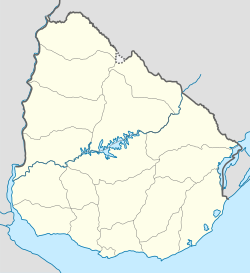Santiago Vázquez is a village at the western limits of Montevideo Department in Uruguay.
Santiago Vázquez | |
|---|---|
Village | |
 The port of Santiago Vázquez | |
| Coordinates: 34°47′24″S 56°21′02″W / 34.79000°S 56.35056°W | |
| Country | |
| Department | Montevideo Department |
| Population (2004) | |
• Total | 1,482 |
| Time zone | UTC -3 |
| Postal code | 12600 |
| Dial plan | +598 2 (+7 digits) |
Geography
editIt is located at the mouth of the river Río Santa Lucía towards the Río de la Plata, 22 kilometres (14 mi) from the centre of Montevideo.
History
editIt was given this name by a decree of 1912, in honor of a politician and co-founder of the Constitution of 1830. It was declared a "Pueblo" by decree Ley Nº 4.049 on 1 July 1912.[1]
Population
editIn 2004, Santiago Vázquez had a population of 1,482 inhabitants.[2]
| Year | Population |
|---|---|
| 1963 | 1,545 |
| 1975 | 1,323 |
| 1985 | 1,387 |
| 1996 | 1,670 |
| 2004 | 1,482 |
Source: Instituto Nacional de Estadística de Uruguay[1]
Features
editIt is surrounded by an ecologically important natural environment consisting of coasts, beaches and hills. It has a natural port which is part of the river delta and includes 25.000 hectares of wetlands. During the first half of the 20th century the village was converted into a touristic centre, marked by the construction of the "Hotel de la Barra", the boat races, the yacht club and the parks "Parque Segunda República Española" and Parque Lecocq.
Santiago Vázquez is also known as "La Barra", from the rotary iron bridge of British construction which along with the modern bridge of Ruta 1, join Montevideo with the San José Department.
Places of worship
edit- Parish Church of Our Lady of the Guard and St. Aloysius Gonzaga, Silvestre Ochoa 434 (Roman Catholic)
See also
editReferences
edit- ^ a b "Statistics of urban localities (1963–2004)" (PDF). INE. 2012. Retrieved 4 September 2012.
- ^ "2004 Census of Montevideo department" (XLS). INE. 2004. Retrieved 8 July 2011.
External links
edit- Intendencia de Montevideo/Local development (Spanish)
- Club Alemán de Remo Monevideo (Spanish)
- INE map of Santiago Vázquez
